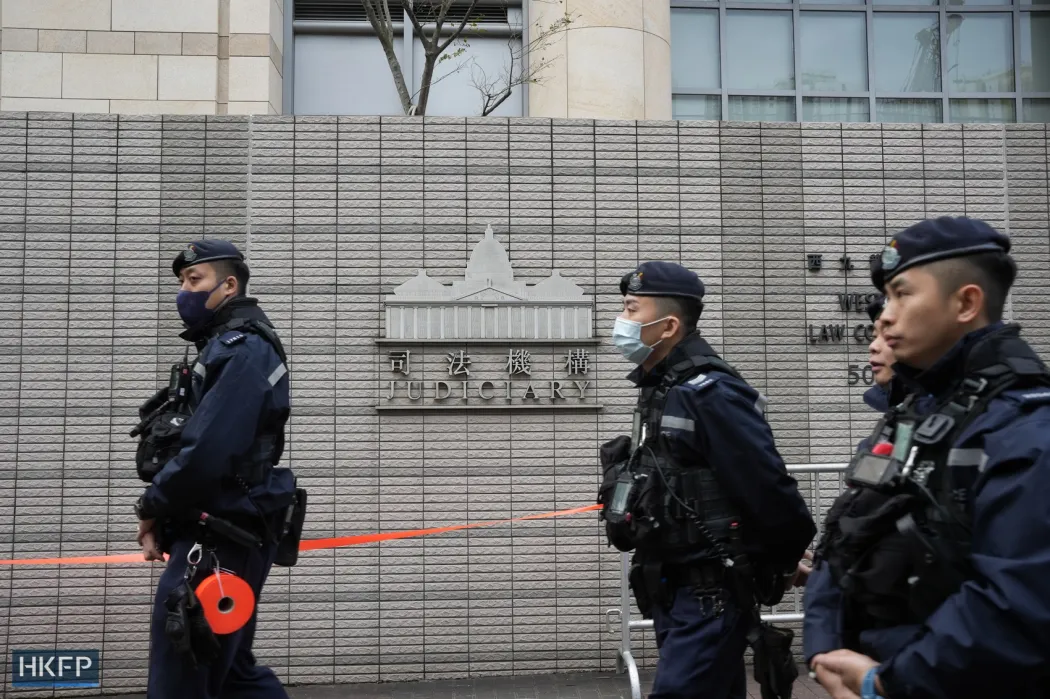Hong Kong media mogul Jimmy Lai used his pro-democracy tabloid Apple Daily, which ceased operations in 2021, as a platform to “sway public opinion” and “promote hatred” against Beijing and Hong Kong authorities, a court has heard as the closely-watched national security trial entered its fifth day.

Prosecutors resumed their opening arguments on Wednesday at the West Kowloon Law Courts Building, after Lai, 76, pleaded not guilty on Tuesday to two counts of conspiring to collude with foreign forces and one count of conspiring to publish “seditious” materials. The collusion charge, an offence under the Beijing-imposed national security law, carries a maximum penalty of life in prison.
Lead prosecutor Anthony Chau began on Wednesday by citing multiple articles published by Apple Daily amid the protests and unrest in 2019, alleging that those articles amounted to “seditious publications” that incited hatred against Beijing and the Hong Kong government.
“[The articles] were published to sway public opinion against the central authorities and [the Hong Kong government], against the regime and the political order,” Chau said.
Chau said that the government had suspended and later withdrawn its proposed amendment to the city’s extradition bill following large-scale protests in June 2019. But the city was still rocked by violent protests, marking an “onset of unrest” despite attempts by the authorities to maintain law and order.

Chau read out excepts from an article titled, “From peaceful to violent: It was the regime that forced me to transform,” published in October 2019, saying that the article alleged that the authorities had forced protesters to resort to violence.
The prosecutor also cited two articles, published in August 2019 and January 2020, that were said to have called on the international community to place sanctions on mainland Chinese and Hong Kong officials.
Chau mentioned another article published in October 2019, which was said to have “promoted hatred against the police by alleging all police were ‘black cops,'” a term used by protesters to refer to corrupt police officers.
While the articles were not written by Lai, they were published “under the direction and instruction” of Lai as the owner of the tabloid, Chau told the court. WhatsApp records presented on Wednesday suggested that Lai had at times instructed some former employees, including Next Digital CEO Cheung Kim-hung and associate publisher Chan Pui-man, about what to publish. Both Cheung and Chan are set to testify against Lai.
Columns by Jimmy Lai
The prosecution also cited several columns penned by Lai, accusing him of continuing to make seditious statements during the 2019 protests and the Covid-19 pandemic.
Chau highlighted opinion pieces written by Lai for other outlets in an “attempt to gain greater [international] influence,” citing an article titled, “There’s hope for freedom, even in China”, published in The Wall Street Journal in September 2019.

During the pandemic, Lai had used his column in Apple Daily to promote hatred against Beijing and China’s leader Xi Jinping, Chau said, adding that Lai had described the Covid-19 pandemic as the “Wuhan pandemic” and Xi as “Emperor Xi.”
Lai had also repeatedly called on the public to resist Beijing by alleging that the Chinese Communist party “had no credibility in governing,” as well as to “mount insurgence” against the Hong Kong government, Chau added.
Foreign ties
Chau also pointed to a Twitter account set up by Lai in May 2020, with which he promoted English-language content published by Apple Daily and interacted with foreign politicians.
Chau said that Lai had followed 53 Twitter accounts, including then US vice-president Mike Pence, Taiwan President Tsai Ing-wen, and UK-based activists Luke de Pulford and Benedict Rogers.
Alex Lee, one of three designated national security judges presiding over the trial, challenged Chau on the purpose of showing the list of Twitter accounts Lai had followed.
“He’s interested in international affairs, so?” Lee said.

But Chau said the list amounted to evidence suggesting the connections between Lai and foreign politicians.
The prosecution also played footage of various episodes of “Live Chat with Jimmy Lai,” a programme launched by Apple Daily featuring Lai and guests including foreign politicians, academics, and activists discussing topics such as US policies on mainland China and the city.
Chau alleged that Lai was using the programme to push for international sanctions against Hong Kong and mainland China, and it was evidence of Lai’s collusion with foreign elements.
The prosecution will continue their opening arguments on Thursday.
Support HKFP | Policies & Ethics | Error/typo? | Contact Us | Newsletter | Transparency & Annual Report | Apps
Help safeguard press freedom & keep HKFP free for all readers by supporting our team
























